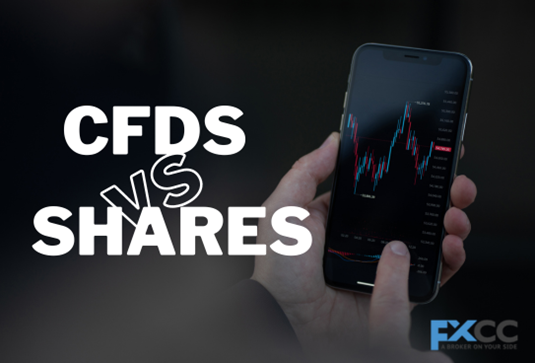Feeling lost in the investment jungle? You’re not alone! Picking the right option can be tricky, especially when faced with terms like “CFDs” and “shares.” But fear not, this guide will break it down in plain English to help you chart a course that unleashes your financial potential!

The Contenders: Unmasking CFDs and Shares
- CFDs (Contracts for Difference): Imagine a game where you predict if a stock, like Apple or Tesla, will go up or down. That’s a CFD! You don’t actually own the stock, but you place a bet on its price movement. Think of it like a high-five agreement with a broker, saying “If Apple goes up, you pay me, if it goes down, I pay you.” The catch? You can use leverage, like a magnifying glass, to control a bigger bet with less money upfront.
- Shares (Stocks): When you buy shares, you’re basically buying a tiny slice of a company, like owning a piece of the pie (hopefully a delicious, profitable pie!). The value of your slice goes up and down with the company’s performance. Plus, you might even get a bonus called a dividend, like a small thank-you gift from the company for being a shareholder.
The Pros and Cons: Weighing the Options
CFDs:
- The Pros :
- Flexibility: You can bet on stocks going up (going long) or down (going short), giving you more options to navigate the market.
- Potentially Bigger Wins: Leverage can magnify your profits, but remember, bigger wins come with bigger risks!
- Lower Starting Cost: You don’t need a ton of money to get started, thanks to leverage.
- The Cons:
- High Risk: Leverage can also magnify your losses, so be careful not to bet more than you can afford to lose!
- Fees: There can be extra charges, like overnight fees, that eat into your profits.
- Tricky Business: CFDs can be complex, so make sure you understand them before diving in.
Shares:
- The Pros:
- Ownership: You actually own a part of the company, which can be exciting! Plus, you might get those sweet dividends.
- Easier to Understand: Shares are a simpler concept to grasp compared to CFDs.
- Long-Term Potential: Shares can be a great way to build wealth over time, like watching a sturdy oak tree grow strong and tall.
- The Cons:
- Less Flexibility: You can only buy shares and hope they go up (no betting on them going down).
- More Money Upfront: You need to have enough cash to buy the entire share, not just a portion.
- Market Swings: Share prices can bounce around like a beach ball on a windy day, so be prepared for some ups and downs.
Choosing Your Champion: It’s All About You!
Before picking your investment partner, consider these factors:
- Risk Tolerance: Are you comfortable with potentially losing more than you invested? If not, shares might be a safer bet.
- Investment Goals: Looking for quick wins or long-term growth? CFDs might be for short-term gains, while shares are better for building wealth over time.
- Investment Knowledge: Feeling confident about financial markets? Great! If not, shares might be a simpler starting point.

Bottom Line!
The investment landscape isn’t a one-size-fits-all jungle gym. It’s a vast wilderness with diverse paths, each catering to different risk appetites and goals. CFDs might be the alluring mountain peak for experienced climbers, offering stunning views (and potential for high falls). But for most explorers, shares are the well-worn forest trail, providing a steady ascent towards long-term growth, ownership, and transparency. Remember, a successful trek requires a map (thorough research) and a compass (a well-defined plan). Don’t be afraid to consult a seasoned guide (financial advisor) for personalized navigation. By carefully choosing your path, you can transform from a nervous tourist into a confident investor, ready to conquer your financial goals!
FAQs:
A: Hold off on CFDs! Shares are a gentler hike for beginners, offering ownership and long-term growth.
Q: So, shares are always the better option?
A: Not always! Shares are great for the long-term, but CFDs offer flexibility and potentially quicker gains (or losses). Remember, the risk is high with CFDs.
Q: This whole investment thing sounds complicated. What can I do?
A: Research is your map! A financial advisor can be your guide, helping you navigate and choose the right path.
Q: Are there any hidden fees with CFDs?
A: Watch out! CFDs can have extra fees that chip away at your profits. Factor them in before you start.
Q: I’m still unsure. What’s the best way to decide? A: Know your risk tolerance! Are you a thrill-seeker or a steady hiker? CFDs are for risk-takers, shares are for long-term investors. A financial advisor can help you choose the right path.


